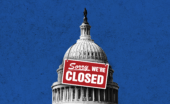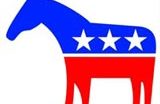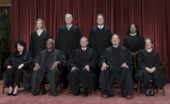Johannah Bernstein post: "eternally proud of my father’s extraordinary aeronautical engineering. legacy. here is a photo of the Canadair Water…
U.S. Economy September 2025-
Written by Diana Thebaud Nicholson // November 7, 2025 // Economy, Government & Governance, Justice & Law, U.S. // No comments
What is the ‘Mar-a-Lago Accord,’
the next wacky scheme from Trump’s America?
Macro & Markets: Mar-a-Lago accord?
There has been much focus that Trump could force the US trading partners into a “Mar-a-Lago Accord” to weaken the dollar.
In Trump’s opinion the main reason for the demise of the American Dream is an artificially strong dollar which has led to the dismantlement of US manufacturing and loss of “well-paying blue collar jobs”. The strong dollar is a result of its status as reserve currency which amplifies investments into the US. With local manufacturing uncompetitive, the US is then forced to increase imports leaving it dependent of foreign countries for a number of goods. With other countries (China for instance) unfairly supporting their manufacturing sector, the problem is amplified. Connected to this problem is also the US role of global police, leaving it with a large military cost burden which again leads to public deficits and debts (easily financed because of the dollar’s reserve status).(27 March)
‘Costs are down!’ Trump declares inflation ‘solved’ as gas and grocery prices soar
(Raw Story) President Donald Trump has declared inflation “solved” as Americans are paying more for everyday goods like gas and groceries.
“I’ve already solved inflation,” Trump told “Fox & Friends” on Friday [12 September] morning. “Costs are down.”
Inflation is now the highest it’s been since January, according to CNBC.
7 November
Trump Is Pushing Us Toward a Crash. It Could Be 1929 All Over Again.
By William A. Birdthistle, director of the Division of Investment Management at the U.S. Securities and Exchange Commission from 2021 to 2024
(NYT) President Trump’s Halloween party at Mar-a-Lago, set to the theme of “The Great Gatsby,” re-enacted the decadence of that story’s licentious era: befeathered flappers shimmying in the crowd; gilded and onyx décor; scantily clad women posing in an enormous champagne coupe. The revelatory moment says so much about where we stand today — and what we could be lurching into next.
Published a century ago, F. Scott Fitzgerald’s “The Great Gatsby” captured the culture of an overheated economy on the brink of demise
… Speculative money is once more pouring into risky investment schemes, with staggering sums of money being thrown at artificial intelligence and cryptocurrencies. But rather than heed a century of hard-won lessons, the Trump administration’s financial regulators are embracing dissolute policies to keep the punch flowing.
The financial excesses of 100 years ago teach us how high the costs of negligent oversight of our markets can be. When sentinels sleep, fraudsters flourish; their frenzied celebration of unreal profits pumps froth into the market; ultimately, with panic and pain, bubbles will burst. As stages of that cycle are recurring, we must decide whether to intervene now — or to mop up the mess later.
6 November
Rich Drive Economy as More Americans Struggle
(Bloomberg) … The US economy is becoming a Jenga tower, one economist told Bloomberg, increasingly fueled by the profligate spending of the rich while a growing number of people must choose between car payments and dinner. This dichotomy isn’t new, but recent months are witnessing an even starker divide, one that some experts say makes the economy more susceptible to recession.
The data are sobering: The richest 10% of households are fueling almost half of total US spending thanks in part to the aforementioned stock market frenzy. Meanwhile, lower-income and middle class families are pulling back in the face of tight budgets, higher costs of living and a grim, rising tide of mass firings.
5 November
Longest Shutdown in History Costs US Economy About $15 Billion Each Week
Past shutdowns have left only temporary scars, but this time is different
By Jarrell Dillard and Josyana Joshua
(Bloomberg) The US government shutdown has become the longest in history, and with no sign of a resolution soon its economic toll is deepening.
… Every week that passes costs the economy anywhere from $10 billion to $30 billion, based on analysts’ estimates, with several landing in the $15 billion range.
15-18 September
Trump administration asks Supreme Court to allow for firing of Fed governor
(SCOTUS blog) The Trump administration on Thursday asked the Supreme Court to pause a ruling by a federal judge in Washington, D.C., that keeps Lisa Cook, a member of the Federal Reserve’s Board of Governors, in office despite President Donald Trump’s attempt to fire her in the wake of allegations that she committed mortgage fraud before joining the board. (Cook has denied the allegations, and several news outlets have since reported on financial documents that may undermine the government’s contentions.) U.S. Solicitor General D. John Sauer, the government’s top lawyer before the court, told the justices that the ruling by U.S. District Judge Jia Cobb was “yet another case of improper judicial interference with the President’s removal authority—here, interference with the President’s authority to remove members of the Federal Reserve Board of Governors for cause.”
The Trump administration’s request came just one day after the Federal Reserve’s two-day September policy meeting, at which the Fed lowered interest rates by a quarter of a point, the first cut since December 2024. Trump has criticized the chair of the Fed, Jerome Powell, for not lowering interest rates. Cook participated in the meeting and joined 10 other governors in voting for the rate cut; Stephen Miran, who was recently appointed to the board by Trump, would have imposed a larger cut.
The Supreme Court is about to decide one of the biggest economic policy cases ever
Cook v. Trump is one of the highest-stakes cases of Trump’s presidency.
(Vox) A long-simmering showdown over whether President Donald Trump may seize control over the Federal Reserve appears to be entering its endgame. It is highly likely that the Supreme Court will weigh in on this dispute either Monday evening or Tuesday.
If the Court does side with Trump, that would be one of the most consequential economic policy decisions in the federal judiciary’s history. And it could potentially have disastrous consequences both for investors and for the US economy broadly.
… The Fed essentially has the power to inject cocaine into the US economy. When the Fed lowers interest rates, it makes it easier for businesses to borrow money that they can use to begin new projects and hire new workers. But it also risks spiking inflation rates. Thus, if the president controls the Fed, he can engineer a short-term, politically advantageous boost to the economy — but at the cost of much greater economic turmoil down the road.
… In any event, a lawsuit known as Cook v. Trump is now barreling toward the Supreme Court, and is likely to land on the justices’ doorstep as soon as Monday night. Trump has asked the courts to weigh in on this case on an exceedingly expedited basis, in the hopes that he can gain the power to fire Federal Reserve governors in advance of an important Fed meeting that begins Tuesday.
17 September
The Trump Fantasy Is Unraveling
Jamelle Bouie
The essence of President Trump’s pitch to the American people last year was simple: They could have it both ways.
(NYT) In reality, this was a fantasy. Americans could have a strong, growing economy, which requires immigration to bring in new people and fill demand for labor, or they could finance a deportation force and close the border to everyone but a small, select few. It was a binary choice. Theirs could be an open society or a closed one, but there was no way to get the benefits of the former with the methods of the latter.
Now, about eight months into Trump’s second term, the reality of the situation is inescapable. As promised, Trump began a campaign of mass deportation. Our cities are crawling with masked federal agents, snatching anyone who looks “illegal” to them — a bit of racial profiling that has, for now, been sanctioned by the Supreme Court. The jobs, however, haven’t arrived. There are fewer manufacturing jobs than there were in 2024, thanks in part to the president’s tariffs and, well, his immigration policies.
We got a vivid glimpse of what it looks like for harsh immigration policies to undermine growth and investment earlier this month, in Georgia, when immigration officials detained hundreds of South Korean nationals working at a battery plant in a small town outside Savannah.
The consequences of this raid go beyond the trauma inflicted on the workers. The South Korean public is furious, not the least because this raid came just weeks after the country’s government promised to pour billions of dollars into new investments in the United States. “If U.S. authorities detain hundreds of Koreans in this manner, almost like a military operation, how can South Korean companies investing in the U.S. continue to invest properly in the future?” Cho Jeongsik, a lawmaker from the liberal governing Democratic Party, asked.
10 September
Trump’s Economic Agenda Hinges on the Supreme Court’s Tariff Ruling
For the president, the power to issue limitless tariffs is at the heart of his second-term vision, from trade to foreign policy.
(NYT) When President Trump unveiled his initial slate of punishing tariffs in April, he fashioned the announcement as a critical moment in a dawning global trade war, describing it as “the day America’s destiny was reclaimed.”
Five months later, his gambit could be in peril, after the Supreme Court agreed on Tuesday to hear a case challenging the legality of Mr. Trump’s actions. Now his administration is confronting the potential loss of a powerful tool at the heart of his second-term strategy, one that has allowed the president to force concessions from companies, allies and adversaries.
The case itself concerns Mr. Trump’s novel use of a decades-old economic emergency law to impose duties around the world, despite the fact that the statute does not explicitly allow for the president to tax imports.



